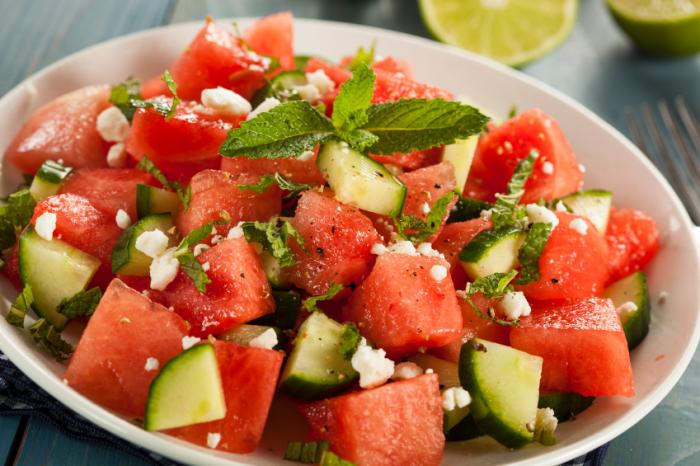The cucumber is a member of the botanical family Cucurbitaceae, along with honeydew, cantaloupe and watermelon. Made up of 95% water, cucumbers are naturally low in calories, fat, cholesterol and sodium.
Their high water content helps ward off dehydration and combat the heat while their refreshing and mild taste appeals to even the pickiest eaters.
This article provides a nutritional breakdown of the cucumber and an in-depth look at its possible health benefits, how to incorporate more cucumber into your diet and any potential health risks of consuming cucumber.
Contents of this article:
- Nutritional breakdown of cucumber
- Possible health benefits of consuming cucumber
- How to incorporate more cucumber into your diet
- Potential health risks of consuming cucumber
1. Nutritional breakdown of cucumber

The cucumber is made up of 95% water, cucumbers are naturally low in calories, fat, cholesterol and sodium.
According to the USDA National Nutrient Database, 1 cup of raw sliced cucumber with peel (approximately 119 grams) contains 115 grams of water, 16 calories, 0.8 grams of protein, 0.2 grams of fat and 2.9 grams of carbohydrate (including 0.9 grams of fiber and 1.8 grams of sugar.
One cup of cucumber provides 11% of vitamin K, 4% of vitamin C, magnesium, potassium and manganese and 2% of vitamin A, thiamin, riboflavin, B-6, folate, pantothenic acid, calcium, iron, phosphorus, zinc and copper needs for the day.
Cucumbers also contain lignans, which research has shown my decrease the risk of cardiovascular disease as well as several types of cancer.
2. Possible health benefits of consuming cucumber
Consuming fruits and vegetables of all kinds has long been associated with a reduced risk of many adverse health conditions. Many studies have suggested that increasing consumption of plant foods like cucumber decreases the risk of obesity, diabetes, heart disease and overall mortality while promoting a healthy complexion, increased energy, and overall lower weight.
Hydration
Made up of mostly water and full of important electrolytes, cucumber is a perfect food to have on hand during the hot summer months to prevent dehydration. Adding cucumber to water is a great way to increase water consumption as well.
Skin
When used topically, cucumber has a cooling and soothing effect that decreases swelling, irritation and inflammation. Cucumber slices can be placed on the eyes to decrease morning puffiness or placed on the skin to alleviate and treat sunburn.
Bone health
Low intakes of vitamin K have been associated with a higher risk for bone fracture. Adequate vitamin K consumption can be achieved by eating a proper intake of fruits and vegetables (one cup of cucumber provides 11% of your daily needs) and is important for improving calcium absorption essential for optimal bone health.1
3. How to incorporate more cucumber into your diet
Cucumbers should be stored in the refrigerator for up to one week to maintain their freshness. Some cucumbers are treated with a wax coating after they are picked; do not wash these before storing but make sure to wash thoroughly or peel before consuming. Avoid cucumbers with ends that are shriveled or withered.
Cucumbers are best when consumed raw and have a mild taste and cool crunch that make them a great addition to any salad or sandwich.

Cucumber makes a great addition to any salad or sandwich.
- Try mixing sliced cucumbers, tomatoes and feta cheese for a Greek style side dish
- Jazz up your water by adding mint leaves and cucumber for a refreshing treat
- Slice cucumbers into thick slices and dip them in your favorite hummus.
Try some of these healthy and delicious recipes with cucumber:
Avocado garden salad
Toasted caprese "slamwich"
Easy tzatziki and greek pita pockets
Cucumber lime refresher
Cucumber ranch dressing
Toasted caprese "slamwich"
Easy tzatziki and greek pita pockets
Cucumber lime refresher
Cucumber ranch dressing
4. Potential health risks of consuming cucumber
The Environmental Working Group produces a list each year of fruits and vegetables with the highest levels of pesticide residue, known as the Dirty Dozen.
Cucumbers are high on the pesticide residue list of produce that the EWG suggests that you buy organic to ensure a lower risk of pesticide exposure. If you can't afford organic, don't fret; the nutritional benefit of eating conventionally grown (non-organic) produce far outweighs the risk of not eating produce at all.
It is the total diet or overall eating pattern that is most important in disease prevention and achieving good health. It is better to eat a diet with a variety than to concentrate on individual foods as the key to good health.
References:
- 1. Bone health: looking beyond calcium, Nutrition 411, last reviewed March 2009, accessed 20 December 2013.
- 2. Free radical scavenging and analgesic activities of cucumis sativus L. fruit extract, Kumar D1, Kumar S, Singh J, Narender, Rashmi, Vashistha B, Singh N.J Young Pharm, 2010 Oct;2(4):365-8, doi: 10.4103/0975-1483.71627, abstract.
No comments:
Post a Comment